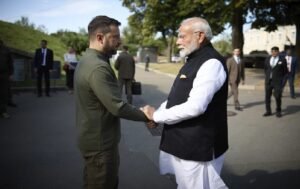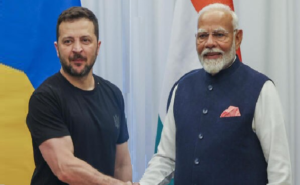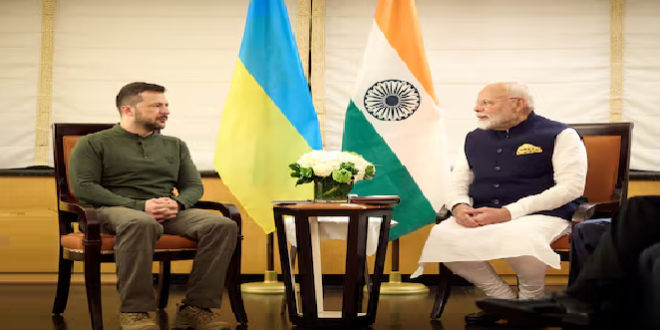02-09-2025
Bureau Report
NEW DELHI: Indian Prime Minister Narendra Modi reaffirmed his support on Saturday for a peaceful settlement in Ukraine during a telephone conversation with Ukrainian President Volodymyr Zelenskiy, Modi’s office said.
Zelenskiy, speaking in his nightly video address, said Modi supported Ukraine’s call for a ceasefire in the war with Russia and hoped that notion would be heard at the forthcoming Shanghai Cooperation Organization summit in China.
 Modi’s office, in a statement, said Zelenskiy shared the Indian prime minister’s perspective on recent developments related to Ukraine, while Modi stressed India’s support for efforts aimed at the earliest restoration of peace.
Modi’s office, in a statement, said Zelenskiy shared the Indian prime minister’s perspective on recent developments related to Ukraine, while Modi stressed India’s support for efforts aimed at the earliest restoration of peace.
“The leaders also reviewed progress in the India-Ukraine bilateral partnership and discussed ways to further enhance cooperation in all areas of mutual interest,” it said.
Modi is due to attend the SCO summit, which opens on Sunday in the Chinese city of Tianjin. “I have just spoken with Indian Prime Minister Modi about precisely what is going on. Russia is continuing the war, continuing to kill,” Zelenskiy said.
“It is important that the prime minister of India supports the idea that a ceasefire is needed and would be a clear signal that Russia is ready for diplomacy. We are counting on this being heard at the meeting in China.”
The statement from Modi’s office made no mention of a call for a ceasefire.
Ukraine, backed by European countries, has long called for a ceasefire in hostilities as an important initial step to resolving the conflict.
US President Donald Trump initially urged Russia to agree to a ceasefire but since his talks this month with Kremlin leader Vladimir Putin in Alaska has said that a ceasefire is not a vital element in moving towards a solution.
Speaking earlier on Saturday after overnight attacks on southeastern Ukraine, Zelenskiy said Moscow had used preparation time for a meeting of leaders of both countries to launch new attacks on his country.
 On Friday, Zelenskiy brought up Trump’s deadline for deciding on new measures against Russia if Putin fails to commit to a one-on-one meeting with the Ukrainian leader.
On Friday, Zelenskiy brought up Trump’s deadline for deciding on new measures against Russia if Putin fails to commit to a one-on-one meeting with the Ukrainian leader.
Shortly after meeting Vladimir Putin in Moscow on August 6, US special envoy Steve Witkoff delivered major news to Donald Trump; the Russian president was prepared to offer significant territorial concessions to end his war in Ukraine.
Following Witkoff’s readout to the US president, described by two people briefed on the matter, Trump hailed his emissary’s “great progress” and agreed to hold a historic summit with Putin, indicating that a land swap was on the table but the diplomatic drive soon descended into confusion.
On an August 7 call with several European leaders, Witkoff indicated that Putin was willing to withdraw from the Ukrainian regions of Zaporizhzhia and Kherson in return for Kyiv ceding Donetsk and Luhansk, according to a source familiar with the exchange.
The proposal startled many of those on the call, since it departed sharply from their own assessments of Putin’s position, said four people with knowledge of the discussions, including US and European officials who requested anonymity to discuss sensitive matters.
Witkoff appeared to change his account the next day. In a call convened by US Secretary of State Marco Rubio with European national security advisers, the envoy said Putin was not in fact offering to withdraw from the two territories in question, according to one of the sources.
 Pressmediaofindia
Pressmediaofindia




